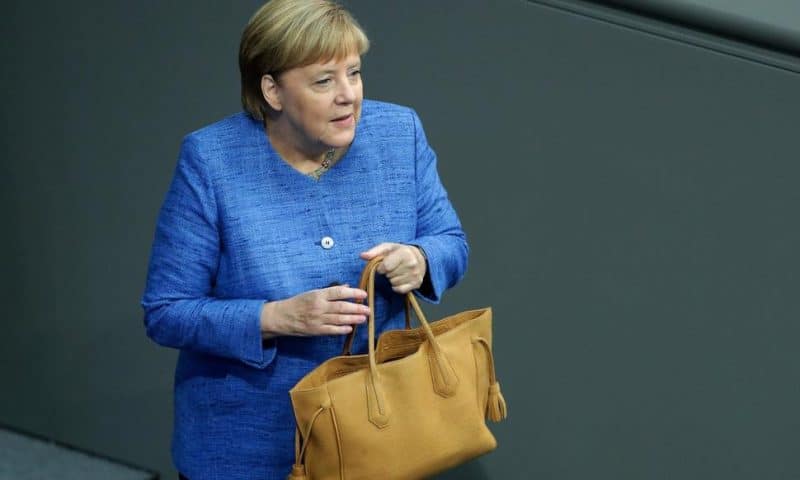Germany faces a decisive week in its efforts to combat climate change, with Chancellor Angela Merkel pledging Saturday that Europe’s biggest economy will find good solutions.
BERLIN — Germany faces a decisive week in its efforts to combat climate change, with Chancellor Angela Merkel pledging Saturday that Europe’s biggest economy will find good solutions but her governing coalition still haggling over a long-promised policy package.
Merkel’s government has said for months that it will unveil a package of measures on Friday to ensure that Germany cuts its greenhouse gas emissions by 55% by 2030 compared with 1990. It is under pressure to deliver a result that offers convincing measures without overly burdening the economy and voters, but parties in the coalition have argued about how to do so.
The package is a test of credibility both for the fractious coalition of Merkel’s center-right Union bloc and the center-left Social Democrats and for the chancellor herself. It offers her the chance to reclaim the mantle of “climate chancellor,” a title often used in her early days in office that has faded over the years, especially in her final term as German leader.
In her weekly video message, Merkel said “climate protection is a challenge for humanity” and that “we need a real feat” to deal with it.
“It is not enough for us to act internationally,” she said. “Of course we must do that too, but we must do our homework here, at home … unfortunately, we are not yet as good as we should be.”
Germany is set to miss its own emissions goals for 2020 and the country has seen frequent protests, especially by young people, demanding faster action to fight climate change and reduce coal use.
On Saturday, thousands demonstrated in Frankfurt to speed up moves in the auto industry to fight climate change as the world-famous Frankfurt Motor Show opened to the public and another climate change protest took place in the northern city of Hamburg.
Merkel said “we want to give carbon dioxide a price” because “when something has a price, people have an incentive to reduce CO2 emissions.”
She stressed that the German government doesn’t want to take in more money overall, but how exactly the pricing should work has been a bone of contention.
The Social Democrats have advocated raising taxes on energy sources such as gasoline and heating oil, while conservatives prefer an emissions certificate trading system that energy firms would have to participate in. Other proposals have included a reduction of the value-added tax on train tickets and raising taxes on domestic flights.
Coalition leaders met for over five hours on Friday night and agreed to meet again Thursday to thrash out the final details of the climate package.
“I want us to succeed in making the climate protection law a resounding success and not to get lost in little things and individual measures,” the Social Democrats’ general secretary, Lars Klingbeil, told the dpa news agency.
Merkel said she is confident of finding satisfactory solutions.
“I am absolutely certain that Germany can find its way to good climate protection,” she said.

